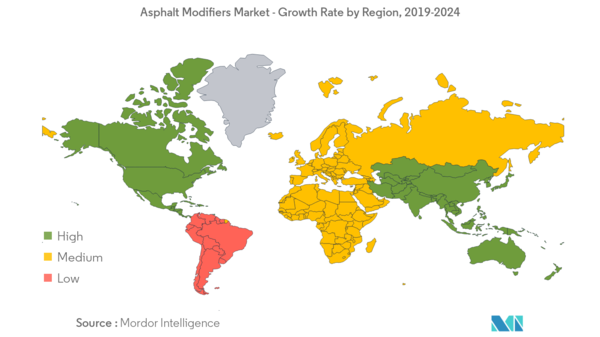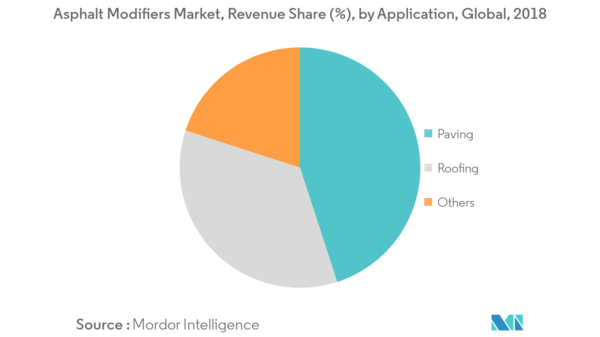The market for asphalt modifiers is anticipated to register a CAGR of more than 6% during the forecast period. Asphalt is manufactured from the distillation of crude oil, during the process of petroleum refining. The major characteristics of asphalt include adhesion, waterproofing, and thermoplastic durability, among others. ●High traffic volume and heavier loads on roadways, deferred infrastructure maintenance, emphasis on meeting super-save design specifications, increased pavement work-life, and reduced MRO cost advantages are expected to drive the demand for the market, during the forecast period. ●Increasing preference for HMA (Hot Mix Asphalt), growing popularity of reclaimed asphalt pavement (RAP), development of bio-renewable modifiers, advancement in warm mix asphalt technologies, and research for incorporating nanotechnology in asphalt modification (nano-clay) are projected to act as opportunities for the market in the future. Increasing Demand from Paving Application Asphalt concrete mixture has been an important construction material for roads, airport runways, taxiways, bicycle paths, etc. Modifiers, such as binder modifiers (such as polymers, elastomers, fibers, rubber) and aggregate modifiers (such as lime, granulated rubber, anti-strip agents) are used to improve the performance of asphalt pavements, in terms of increased resistance to pavement distresses, such as thermal cracking, rutting, stripping etc., thereby prolonging the service life. In the recent years, the global demand for asphalt modifiers has been witnessing an above average growth. The demand for asphalt modifiers has a direct correlation with the level of ongoing road construction activities around the world. The gradual changes in the way mobility and transportation are consumed are expected to be witnessed, over the coming decades. By 2030, annual passenger traffic is expected to exceed 80 trillion passenger-kilometers. Global freight volumes is likely to grow by 70%, and an additional 1.2 billion cars are expected to be on the road by 2050. Therefore, to meet the additional demand, improvements in road transport network and up-gradation activities of highway infrastructure are expected to occur during the forecast period, thereby boosting the demand for asphalt modifiers. Major cities across the world are seeing an expansion in bicycle share programs, complementing the growing use of bicycles for commuting. China, in particular, has seen an expansion in bike sharing in the recent years, with Shanghai serving as home to more than 450,000 shared bikes. This is affecting the demand for urban roads, which are being retrofitted with cycle lanes, as well as seeing the development of major new bike thoroughfares for commuting (such as the cycle super highways in London). Highways also need to be increasingly retrofitted, or developed, with high occupancy vehicles lanes, in order to encourage ride-sharing or car-pooling. This trend is expected to drive the demand for asphalt pavements, in turn, driving the demand for asphalt modifiers. source:https://www.mordorintelligence.com/industry-reports/asphalt-modifiers-market

